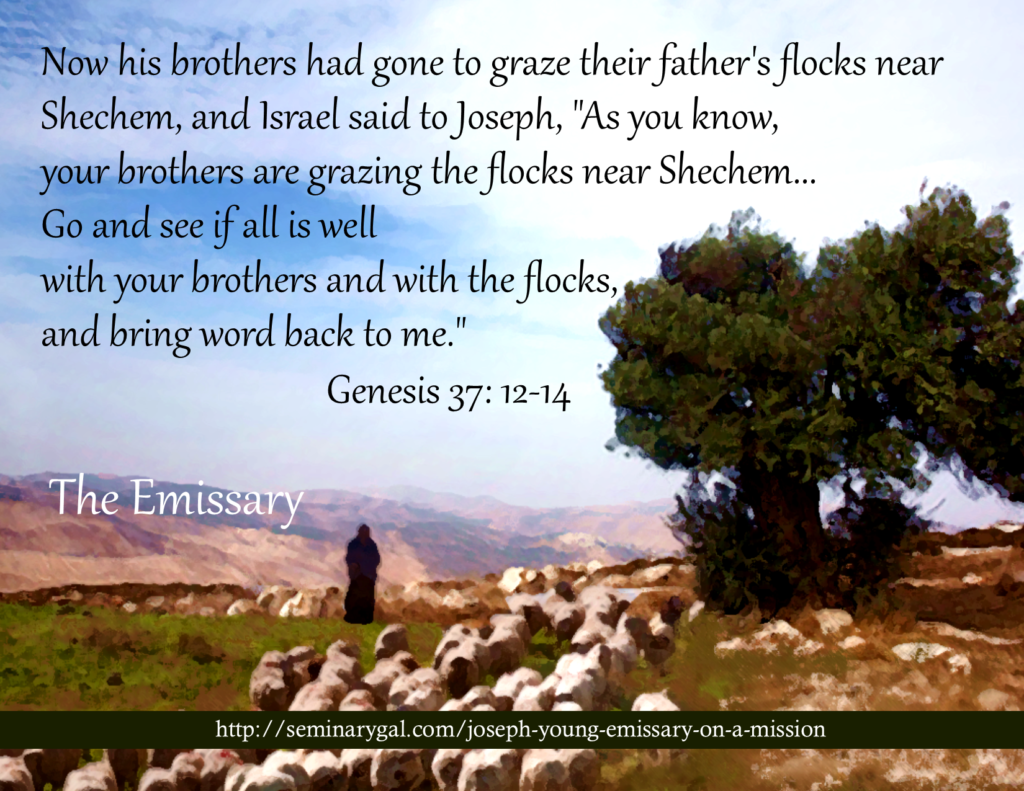Genesis 37: 12 Now his brothers had gone to graze their father’s flocks near Shechem, 13 and Israel said to Joseph, “As you know, your brothers are grazing the flocks near Shechem. Come, I am going to send you to them.” “Very well,” he replied. 14 So he said to him, “Go and see if all is well with your brothers and with the flocks, and bring word back to me.” Then he sent him off from the Valley of Hebron.
All of Joseph’s brothers except probably 10-year-old Benjamin were out working with the sheep. Only Joseph and Benjamin (sons of favorite wife Rachel) would have been at home. Let that sink in. How must the other brothers have felt about this? They’re slaving away near Shechem with their lesser pedigrees in the hot sun with a bunch of stinkin’ sheep. But Joseph—seventeen and old enough to dream of authority with his famous coat–is hanging out with baby brother and dear old Dad in the shade of a tent in the Valley of Hebron.
Then it’s like he’s Agent 007 getting sent on a mission. Jacob says, “As you know” … and then sends him to investigate the brothers and report back.
Only Jacob didn’t know it was a dangerous mission or that Joseph as emissary wouldn’t return as planned.
But let’s not jump ahead of ourselves. Joseph is sent on a mission to Shechem which was a good four or five-day journey. He no doubt had a lot to think about as he traveled in the now famous coat. Pondering dreams? Fear of the wilderness? The Ancient Near East equivalent of being afraid to wear Canada Goose jackets or Air Jordans for fear of being killed for what you’re wearing because it’s a prestige item and an invitation for robbers? Who knows?
 .
.
One wonders if Joseph saw anyone earlier along the journey and whether they thought he might be a dignitary or a rich guy or wanted to get his autograph or kill him and take his coat. Scripture doesn’t say, hinting that those details are unimportant for the story’s progression.
What is important is that Joseph obeyed a direct command from Dad to go look in on his brothers and to issue another report. Since it went so well the last time. Not.
Think about it:
- If Joseph had taken it upon himself to observe his brothers and report back, the responsibility would have been his alone and his father would have experienced one level of regret. What type of regret would that have been?
- To send your favorite son into a situation that your favoritism created–but you did not see–what does this tell you about the willful blindness of Jacob to the danger he was sending his son into by sending him to do another report?
- Have you ever had such a blind spot toward someone or something that you couldn’t see clearly?
- How does a father sending his son into a situation where he’d be rejected by his brothers and after a time of suffering, rise to being a ruler set a pattern that we’d later see displayed in the life of Christ?
- However, when God sent Jesus into this world to suffer and die for human sin, they both knew exactly what was going to happen. How do we know God knew? How do we know Jesus knew?
- How does Jacob’s not knowing amplify his later regret and reframe his complicity?